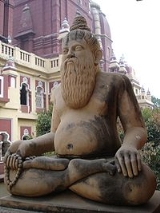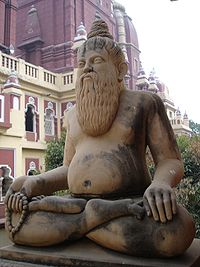
Yogi
Encyclopedia

Yoga
Yoga is a physical, mental, and spiritual discipline, originating in ancient India. The goal of yoga, or of the person practicing yoga, is the attainment of a state of perfect spiritual insight and tranquility while meditating on Supersoul...
. The word is also used to refer to ascetic practitioners of meditation
Meditation
Meditation is any form of a family of practices in which practitioners train their minds or self-induce a mode of consciousness to realize some benefit....
in a number of South Asian Religion
Religion
Religion is a collection of cultural systems, belief systems, and worldviews that establishes symbols that relate humanity to spirituality and, sometimes, to moral values. Many religions have narratives, symbols, traditions and sacred histories that are intended to give meaning to life or to...
s including Jainism
Jainism
Jainism is an Indian religion that prescribes a path of non-violence towards all living beings. Its philosophy and practice emphasize the necessity of self-effort to move the soul towards divine consciousness and liberation. Any soul that has conquered its own inner enemies and achieved the state...
, Buddhism
Buddhism
Buddhism is a religion and philosophy encompassing a variety of traditions, beliefs and practices, largely based on teachings attributed to Siddhartha Gautama, commonly known as the Buddha . The Buddha lived and taught in the northeastern Indian subcontinent some time between the 6th and 4th...
, and Hinduism
Hinduism
Hinduism is the predominant and indigenous religious tradition of the Indian Subcontinent. Hinduism is known to its followers as , amongst many other expressions...
.
Etymology
The word Yogi (SanskritSanskrit
Sanskrit , is a historical Indo-Aryan language and the primary liturgical language of Hinduism, Jainism and Buddhism.Buddhism: besides Pali, see Buddhist Hybrid Sanskrit Today, it is listed as one of the 22 scheduled languages of India and is an official language of the state of Uttarakhand...
: masc , योगी
Devanagari
Devanagari |deva]]" and "nāgarī" ), also called Nagari , is an abugida alphabet of India and Nepal...
; fem ) originally referred in the Classical Sanskrit of the Puranas
Puranas
The Puranas are a genre of important Hindu, Jain and Buddhist religious texts, notably consisting of narratives of the history of the universe from creation to destruction, genealogies of kings, heroes, sages, and demigods, and descriptions of Hindu cosmology, philosophy, and geography.Puranas...
specifically to a male practitioner of Yoga. In the same literature yoginī is the term used for female practitioners as well as divine goddesses and enlightened mothers, all revered as aspects of the Divine Mother Devi
Devi
Devī is the Sanskrit word for Goddess, used mostly in Hinduism, its related masculine term is deva. Devi is synonymous with Shakti, the female aspect of the divine, as conceptualized by the Shakta tradition of Hinduism. She is the female counterpart without whom the male aspect, which represents...
, without whom there would be no yogis. The two terms are still used today but the word Yogi is also generically used to refer to both male and female practitioners of yoga and related meditative practices in Buddhism, Jainism, Taoism etc.
Hinduism
In HinduismHinduism
Hinduism is the predominant and indigenous religious tradition of the Indian Subcontinent. Hinduism is known to its followers as , amongst many other expressions...
the term refers to an adherent of Yoga
Yoga
Yoga is a physical, mental, and spiritual discipline, originating in ancient India. The goal of yoga, or of the person practicing yoga, is the attainment of a state of perfect spiritual insight and tranquility while meditating on Supersoul...
. As an Urdu
Urdu
Urdu is a register of the Hindustani language that is identified with Muslims in South Asia. It belongs to the Indo-European family. Urdu is the national language and lingua franca of Pakistan. It is also widely spoken in some regions of India, where it is one of the 22 scheduled languages and an...
term, yogī (Nastaliq یوگی) is mostly used to refer to wandering Sufi saints and ascetics. The word is also often used in the Buddhist context to describe Buddhist
Buddhism
Buddhism is a religion and philosophy encompassing a variety of traditions, beliefs and practices, largely based on teachings attributed to Siddhartha Gautama, commonly known as the Buddha . The Buddha lived and taught in the northeastern Indian subcontinent some time between the 6th and 4th...
monk
Monk
A monk is a person who practices religious asceticism, living either alone or with any number of monks, while always maintaining some degree of physical separation from those not sharing the same purpose...
s or a householder
Householder (Buddhism)
In English translations of Buddhist literature, householder denotes a variety of terms. Most broadly, it refers to any layperson, and most narrowly, to a wealthy and prestigious familial patriarch...
devoted to meditation
Meditation
Meditation is any form of a family of practices in which practitioners train their minds or self-induce a mode of consciousness to realize some benefit....
. The Shiva Samhita
Shiva Samhita
Shiva Samhita is a Sanskrit text on yoga, written by an unknown author. The text is addressed by the Hindu god Shiva to his consort Parvati . It is one of three major surviving classical treatises on hatha yoga, the other two being Gheranda Samhita and Hatha Yoga Pradipika...
defines the yogi Kanabar as someone who knows that the entire cosmos is situated within his own body, and the Yoga-Shikha-Upanishad text distinguishes two kinds of yogis: those who pierce through the "sun" (surya
Surya
Surya Suraya or Phra Athit is the chief solar deity in Hinduism, one of the Adityas, son of Kasyapa and one of his wives, Aditi; of Indra; or of Dyaus Pitar . The term Surya also refers to the Sun, in general. Surya has hair and arms of gold...
) by means of the various yogic techniques and those who access the door of the central conduit (sushumna-nadi) and drink the nectar.
As to what this nectar is, all meditation lineages do focus on self-mastery of essence, both spiritual and sexual. The Yoga-Bhashya, the oldest extant commentary on the Yoga-Sutra offers the following fourfold classification of yogis:
1. neophyte/beginner (prathama-kalpika)
2. one who has reached the "honeyed level" (madhu-bhumika)
3. the advanced practitioner who enjoys enlightenment (prajna-jyotis) and,
4. the transcender (atikranta-bhavaniya).
In light of the above, many self-described western yogis or certified yoga teachers may in fact be only in the basic stages of development, having an irregular personal practice, along with compulsive discharge of sexual essence. Traditionally, yogic training involved deferring the tantric practices of sexual yoga/marriage until such time that sexual self-mastery had been established, whereupon sexual union is considered to be the ultimate yoga of Shiva
Shiva
Shiva is a major Hindu deity, and is the destroyer god or transformer among the Trimurti, the Hindu Trinity of the primary aspects of the divine. God Shiva is a yogi who has notice of everything that happens in the world and is the main aspect of life. Yet one with great power lives a life of a...
and Shakti
Shakti
Shakti from Sanskrit shak - "to be able," meaning sacred force or empowerment, is the primordial cosmic energy and represents the dynamic forces that are thought to move through the entire universe in Hinduism. Shakti is the concept, or personification, of divine feminine creative power, sometimes...
.
Brahmacarya for yogis, as stated in the Agni-Purana, embodies self-imposed abstention from sexual activity: fantasizing, glorifying the sex act or someone's sexual attraction, dalliance, sexual ogling, sexually flirtatious talk, the resolution to break one's vow, and consummation of sexual intercourse itself, with any being.
Married practitioners aspire to likewise abstain from unconscious/harmful sexual behavior, and to meditatively practice sexual yoga (as opposed to ego-centered sexual release) with their partner, but must practice aware chastity with regard to others.
Modern science now understands that such a code of sexual conduct is also organically assisted by neurochemical changes in brain states of intense meditators (reduced dopamine and increased oxytocin) that induce general relaxation and mental stability, and is not sheerly by willpower alone.
List of Yogis
Historical Yogis and YogaYoga
Yoga is a physical, mental, and spiritual discipline, originating in ancient India. The goal of yoga, or of the person practicing yoga, is the attainment of a state of perfect spiritual insight and tranquility while meditating on Supersoul...
gurus:
- Swami NigamanandaSwami NigamanandaSwami Nigamananda Paramahansa . His followers idealized him as their worshiped and beloved thakura.Nigamananda was a sannyasi of the Shankar's cult...
(1880-1935) - Sivananda Saraswati (1887-1963)
- Tirumalai Krishnamacharya (1888-1989)
- Malladihalli Sri Raghavendra SwamijiMalladihalli Sri Raghavendra SwamijiSri Raghavendra Swamiji of Malladihalli , popularly known as "Malladihalli Swamiji", was a founder of Anatha Sevashrama Trust, Malladihalli...
(1890-1996) - Swami NarayananandaSwami NarayananandaSwami Narayanananda was born in a village in Coorg, Karnataka state, South India. From an early age he practised regular meditation. After finishing his studies, he renounced the world in 1929 and joined the Ramakrishna Mission. After a few years he left for the Himalayas and practised intense...
(1902-1988) - Pranavanda Saraswathi (1908-1982)
- K. Pattabhi Jois (1915-2009)
- Swami Chidananda SaraswatiSwami Chidananda SaraswatiSwami Chidananda Saraswati was President of the Divine Life Society, Rishikesh, India. He is well-known in India as a yogi, jnani and spiritual leader. He succeeded as President of the Divine Life Society in 1963, after the death of his predecessor, Swami Sivananda, who founded the Society.Swami...
(1916-2008) - Prabhat Ranjan SarkarPrabhat Ranjan SarkarPrabhat Ranjan Sarkar , also known by his spiritual name, Shrii Shrii Anandamurti , was an Indian philosopher, author, social revolutionary, poet, composer and linguist...
(1921-1990) - Swami VenkatesanandaSwami VenkatesanandaSwami Venkatesananda , known previously as Parthsarathy, was a disciple of Swami Sivananda Saraswati...
(b. 1921) - Swami KrishnanandaSwami KrishnanandaSri Swami Krishnananda Saraswati Maharaj was a Hindu saint. He was a foremost disciple of Swami Sivananda and served as the General Secretary of the Divine Life Society in Rishikesh, India from 1958 until 2001...
(1922-2001) - Satyananda Saraswati (1923-2009)
- Swami Vishnu-devanandaSwami Vishnu-devanandaSwami Vishnudevananda was a disciple of Swami Sivananda, and founder of the International Sivananda Yoga Vedanta Centres and Ashrams...
(1927-1993) - Albert RudolphAlbert RudolphAlbert Rudolph was born in Brooklyn, New York. Rudi was an entrepreneur and spiritual teacher in New York City.-Early years:...
(1928-1973) - Yogurtus Prime (2010-Present)
- Sadhguru Jaggi Vasudev
See also
- List of yoga schools
- NgagpaNgagpaIn Tibetan Buddhism and Bon, a Ngakpa is a non-monastic practitioner of Vajrayana, shamanism, Tibetan medicine, Tantra and Dzogchen amongst other traditions, disciplines and arts....
- YogaYogaYoga is a physical, mental, and spiritual discipline, originating in ancient India. The goal of yoga, or of the person practicing yoga, is the attainment of a state of perfect spiritual insight and tranquility while meditating on Supersoul...
- YoginiYoginiYogini is the complete form source word of the masculine yogi- and neutral/plural "yogin." Far from being merely a gender tag to the all things yogi, "Yogini" represents both a female master practitioner of Yoga, and a formal term of respect for a category of modern female spiritual teachers in...

